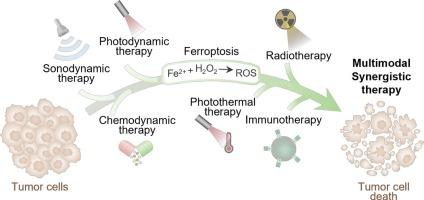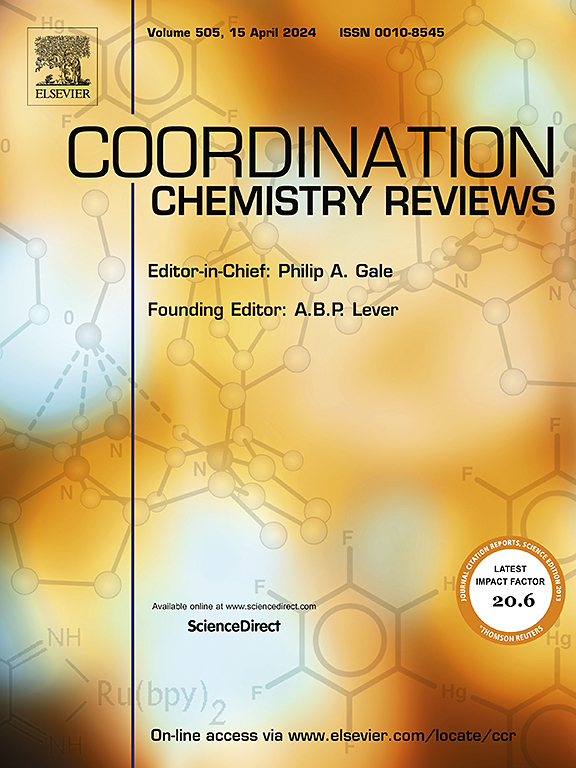Multimodal synergistic ferroptosis cancer therapy
IF 23.5
1区 化学
Q1 CHEMISTRY, INORGANIC & NUCLEAR
引用次数: 0
Abstract
Ferroptosis, driven by iron-dependent lipid peroxidation, has shown considerable promise in cancer therapy due to its distinct biochemical properties and potential for synergistic interaction with other treatments. This review comprehensively explores multimodal synergistic ferroptosis cancer therapy, elucidating mechanistic insights and therapeutic potential. The synergistic dual activation of ferroptosis enhances cancer cell death by overwhelming cellular antioxidant defenses and potentiating cytotoxic effects, offering tailored therapy. Combining ferroptosis with photodynamic therapy (PDT), photothermal therapy (PTT), sonodynamic therapy (SDT) and chemodynamic therapy (CDT) demonstrates synergistic effects in enhancing reactive oxygen species (ROS) generation, disrupting cellular membranes, and inducing immunogenic cell death (ICD), improving treatment outcomes. Integrating ferroptosis therapy with immunotherapy harnesses the immune system to target cancer cells, priming the tumor microenvironment for immune recognition and activation, enhancing immunotherapy efficacy. Challenges and opportunities for multimodal synergistic ferroptosis cancer therapy consist of identifying optimal combinations, elucidating treatment resistance mechanisms, optimizing protocols, and developing targeted delivery systems. The integration of ferroptosis therapy with other modalities holds promise for revolutionizing cancer treatment and advancing precision medicine.

多模式协同铁中毒癌症疗法
由铁依赖的脂质过氧化所驱动的铁氧化,由于其独特的生化特性以及与其他治疗方法协同作用的潜力,在癌症治疗中显示出了相当大的前景。这篇综述全面探讨了多模式协同铁氧化作用癌症疗法,阐明了机理见解和治疗潜力。铁氧化酶的双重协同激活可增强细胞的抗氧化防御能力和细胞毒性效应,从而提高癌细胞的死亡率,提供量身定制的疗法。将铁蛋白沉积与光动力疗法(PDT)、光热疗法(PTT)、声动力疗法(SDT)和化学动力疗法(CDT)相结合,可在增强活性氧(ROS)生成、破坏细胞膜和诱导免疫性细胞死亡(ICD)方面产生协同效应,从而改善治疗效果。将铁氧化疗法与免疫疗法相结合,可利用免疫系统靶向癌细胞,为免疫识别和激活启动肿瘤微环境,从而提高免疫疗法的疗效。癌症多模式协同铁病疗法面临的挑战和机遇包括确定最佳组合、阐明治疗耐药机制、优化方案和开发靶向给药系统。将铁蛋白沉积疗法与其他方式相结合,有望彻底改变癌症治疗方法,推动精准医疗的发展。
本文章由计算机程序翻译,如有差异,请以英文原文为准。
求助全文
约1分钟内获得全文
求助全文
来源期刊

Coordination Chemistry Reviews
化学-无机化学与核化学
CiteScore
34.30
自引率
5.30%
发文量
457
审稿时长
54 days
期刊介绍:
Coordination Chemistry Reviews offers rapid publication of review articles on current and significant topics in coordination chemistry, encompassing organometallic, supramolecular, theoretical, and bioinorganic chemistry. It also covers catalysis, materials chemistry, and metal-organic frameworks from a coordination chemistry perspective. Reviews summarize recent developments or discuss specific techniques, welcoming contributions from both established and emerging researchers.
The journal releases special issues on timely subjects, including those featuring contributions from specific regions or conferences. Occasional full-length book articles are also featured. Additionally, special volumes cover annual reviews of main group chemistry, transition metal group chemistry, and organometallic chemistry. These comprehensive reviews are vital resources for those engaged in coordination chemistry, further establishing Coordination Chemistry Reviews as a hub for insightful surveys in inorganic and physical inorganic chemistry.
 求助内容:
求助内容: 应助结果提醒方式:
应助结果提醒方式:


